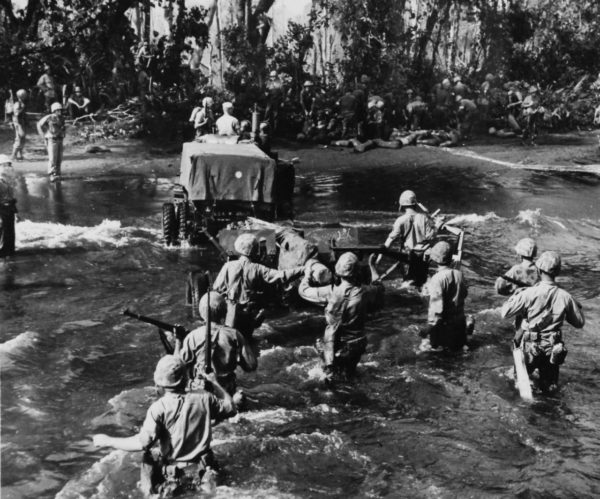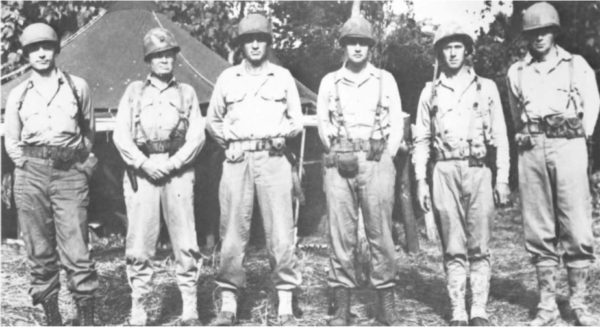Cape Gloucester Valor

On 26 December 1943, Maj. Gen. William H. Rupertus’ First Marine Division lands on the beaches of New Britain. By 16 January, the island was declared secure. The Marines spent the next several months mopping up Japanese resistance on the island. Over the coming days we will be compiling citations for valor of the Marines that fought at Cape Gloucester. From this material we will — hopefully — be able to re-create the story of Operation BACKHANDER.
Please stay tuned.
- Joseph F. Hankins’ Navy Cross citation (12/26/1943)
- Leslie E. Hansen’s Navy Cross citation (12/26/1943)
- Paul L. Hansen’s Navy Cross citation (12/26/1943)
- Joseph A. Terzi’s Navy Cross citation (12/26/1943)
- Elliott B. Sherlock’s Silver Star citation (12/26/1943)
- Philip A. Wilheit’s Navy Cross citation (12/26/1943)
- Frederick L. Adams’ Navy Cross citation (12/26/1943)
- John M. Schmittou’s Silver Star citation (12/26/1943)
- Odell M. Conoley’s Silver Star citation (12/26/1943)
- Lewis B. “Chesty” Puller FOURTH Navy Cross citation (12/26/1943)
- Wilfred R. Proud’s Silver Star citation (12/26/1943)
- Edmond J. Quinn Silver Star citation (12/26/1943)
- Hoyt C. Berry’s Silver Star citation (12/26/1943)
- James H. Quinn Silver Star citation (12/26/1943)
- Virgil J. Sartin’s Silver Star citation (12/26/1943)
- Julien N. Frisbie’s Navy Cross citation (12/26/1943)
- Paul D. Strohkirch’s Silver Star citation (12/26/1943)
- John E. Weber’s Silver Star citation (12/26/1943)
- Robert W. Grove’s Navy Cross citation (12/27/1943)
- Richard D. Bellis’ Silver Star citation (12/28/1943)
- Harold L. Louth’s Navy Cross citation (12/28/1943)
- Tom G. Perkinson Silver Star citation (12/28/1943)
- Carl E. Conron, Jr.’s Navy Cross citation (12/28/1943)
- Anthony DiCristofaro’s Navy Cross citation (12/28/1943)
- Howard E. Bennink’s Silver Star citation (12/28/1943)
- William H. Stagg Jr.’s Silver Star citation (12/28/1943)
- Charles W. Hemenway’s Navy Cross citation (12/29/1943)
- Ray E. Smith’s Silver Star citation (12/29/1943)
- Palmer F. Strausser’s Silver Star citation (12/29/1943)
- Henry W. Stankus’ Navy Cross citation (12/30/1943)
- John S. Stankus’ SECOND Silver Star citation (12/30/1943)
- Harold P. Reynolds’ Navy Cross citation (12/30/1943)
- Langdon R. Secrest’s Navy Cross citation (12/30/1943)
- Guiseppe Guilano Jr. Navy Cross citation (12/30/1943)
- Jim J. Paulos’ Navy Cross citation (12/30/1943)
- Steven T. Gray’s Navy Cross citation (12/30/1943)
- Robert E. Jones’ Navy Cross citation (12/30/1943)
- Harold H. Cathor’s Silver Star citation (12/30/1943)
- William L. Aiken’s Navy Cross citation (1/1/1944)
- Erwin E. Phillips Silver Star citation (1/2/1944)
- John W. Czaja’s Navy Cross citation (1/2/1944)
- Franklin H. Cunningham’s Silver Star citation (1/3/1944)
- William F. Reckus’ Navy Cross citation (1/3/1944)
- John F. Weber’s Navy Cross citation (1/3/1944)
- Edwin A. Schwab’s Silver Star citation (1/3/1944)
- William J Piper Jr.’s Silver Star citation (1/3/1944)
- George Pappas Silver Star citation (1/3/1944)
- Joseph H. Payne Silver Star citation (1/3/1944)
- Lloyd E. Crusan’s Navy Cross citation (1/3/1944)
- Norman R. Schantzenbach’s Silver Star citation (1/3/1944)
- Leonard Cole’s Silver Star citation (1/3/1944)
- John E. Capito’s Silver Star citation (1/3/1944)
- Whitney P. Pierron Silver Star citation (1/3/1944)
- Casimir R. Polakowski’s Navy Cross citation (1/3/1944)
- Gilbert G. Prosek’s Navy Cross citation (1/3/1944)
- William H. Barry, Jr.’s Silver Star citation (1/3/1944)
- Robert W. Carhart’s Silver Star citation (1/3/1944)
- Oswald J. Hedlund’s Navy Cross citation (1/6/1944)
- William J. Wlasiuk’s Navy Cross citation (1/6/1944)
- Joseph E. Buckley’s Navy Cross citation (1/6/1944)
- Paul J. Pesackis Silver Star citation (1/6/1944)
- Richard G. Saylor’s Silver Star citation (1/6/1944)
- Charles O. Jeanes’ Navy Cross citation (1/6/1944)
- Clayton J. I. Straw’s Silver Star citation (1/6/1944)
- Andrew Govel’s Navy Cross citation (1/7/1944)
- Roland P. Smythers’ Silver Star citation (1/7/1944)
- Robert L. Gray’s Navy Cross citation (1/9/1944)
- Clarence E. Angevine’s Navy Cross citation (1/10/1944)
- Thomas R. Cleary Jr.’s Silver Star citation (1/10/1944)
- Cliston R. Prim’s Silver Star citation (1/10/1944)
- Lewis W. Walt FIRST Navy Cross citation (1/10/1944)
- William M. Fleming’s Navy Cross citation (1/10/1944)
- James V. Shanley’s FIRST Navy Cross citation (1/14/1944)
- George O. White’s Navy Cross citation (1/14/1944)
- James T. Podemski’s Silver Star citation (1/14/1944)
- Henry W. Buse Jr.’s Silver Star citation (1/14/1944)
- Robert P. Sachen’s Silver Star citation (1/14/1944)
- Carl L. Steele’s Silver Star citation (1/22/1944)
- Thomas C. Doherty’s Navy Cross citation (1/23/1944)
- Thomas C. Doherty’s Silver Star citation (1/24/1944)
- John S. Sunny’s Silver Star citation (1/25/1944)
- Robert F. Powell’s Navy Cross citation (1/28/1944)
- William L. Bay’s Silver Star citation (1/28/1944)
- Carl Salamoni’s Silver Star citation (3/6/1944)
- Fuller Curtis’ Silver Star citation (3/7/1944)
- Walter H. Cuenin’s Silver Star citation (3/7/1944)
- Robert A. Canfield’s Silver Star citation (3/8/1944)
- Seldon W. Combs’ Silver Star citation (3/15/1944)

From The Campaign on New Britain, by Lt. Col. Frank O. Hough and Maj. John A Crown (USMCR):
In this region hot, humid climate produces that type of jungle known as “rain forest,” characteristic of larger land masses of the Pacific tropics: giant trees towering up to 200 feet into the sky above dense undergrowth lashed together by savage vines as thick as a man’s arm and many times as tough, in the coastal area interspersed with occasional patches of kunai grass sometimes higher than a man’s head, and hip-deep swamps. Decay lies everywhere just under the exotic lushness, emitting an indescribable odor unforgettable to anyone who has lived with it. Insect life flourishes prodigiously: disease-bearing mosquitoes and ticks, spiders the size of dinner plates, wasps three inches long, scorpions, centipedes. Vertebrate animals occur in less variety, the only dangerous creatures indigenous to the region being alligators and giant snakes of the constrictor species.
For all practical purposes, there are only two seasons: wet and less wet.
Densely jungled, with a spine of seemingly impassable mountains […] In the memories of the men who fought there, American, Australian, and Japanese, it will remain one of the evil spots of this world. Nearly everybody had malaria, dysentery or fungus infection, often all three simultaneously; dengue fever and scrub typhus occurred, and among the Japanese beri-beri and scurvy as well. Volcanoes and earthquakes featured the local scene. Twenty Marines were killed by falling trees and at least three by lightning. A corporal found a nine-foot python in his foxhole during an air raid, and an Army officer had his arm chewed off by an alligator. Nine inches of rain fell in a single night, causing one stream to shift its course 200 yards, washing out two regimental CP’s and depositing an eel in the commanding general’s spare field shoes.